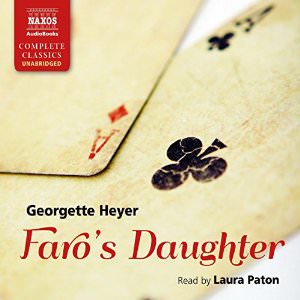 Narrated by Laura Paton
Narrated by Laura Paton
It’s been quite some time since I read Faro’s Daughter, and given my memories of it are rather hazy, listening to this was almost like listening to something completely new. It’s a little different to many of the author’s other romances in that the heroine, while certainly well-born, is not “respectable” because she runs the genteel gaming establishment that is owned by her aunt, Lady Bellingham. It also contains one of the most highly antagonistic central relationships that I can remember reading in her books – the hero and heroine’s barbed banter is often cutting to the point of unpleasantness and in fact, some of the epithets the hero flings at the heroine’s head are downright offensive.
Deborah Grantham and her younger brother were taken in by their aunt upon the death of their father, a man with a large appetite for gaming and very little luck. Lady Bellingham opens her home to “select gaming parties” as a way of making ends meet; preserving the illusion that people attend by invitation only allows her to maintain a façade of respectability.
Deborah is quick-witted, intelligent and practical, although at twenty-six years of age, she is pretty much on the shelf, and the fact that she presides over her aunt’s gaming salon renders her ineligible as a wife for any man of good breeding. Yet the young Viscount Maplethorpe professes himself in love with her and makes clear his desire to marry her – which throws his mother into a panic. She cannot possibly countenance Adrian’s marrying a common hussy – and while he is not yet of age, his birthday in two months’ time will see him finally independent and able to bestow his person and his considerable fortune anywhere he pleases.
In her desperation to prevent such an imprudent marriage, Lady Maplethorpe turns to her nephew, Max Ravenscar for help. Ravenscar is Adrian’s other guardian and is very shrewd, incredibly wealthy, doesn’t care much for society and cares even less for society’s opinion of him. He’s used to getting his own way, and is sure that he can avert disaster by offering the wench money to leave Adrian alone. He attends Lady Bellingham’s that evening to see “this cyprian of Adrian’s” – and is surprised to discover that she is not at all what he had expected. Far from looking, sounding or behaving like a trollop, Miss Grantham is rather lovely
“built on queenly lines, [she] carried her head well, and possessed a pretty wrist, and a neatly turned ankle. She looked to have a good deal of humour, and her voice, when she spoke, was low-pitched and pleasing.”
and he finds himself able to completely understand the reasons for his young cousin’s infatuation.
What Max has no way of knowing is that Deborah has not the slightest intention of marrying Adrian. She is well aware that the young man is merely suffering from a severe case of calf-love and has never given him the slightest encouragement or occasion to believe that she will accept his suit. She is sure he will soon grow out of his attachment to her and is quite happy to let things run their course, in spite of the fact that her aunt keeps dropping massive hints to the effect that Adrian’s fortune would obliterate their financial worries.
But when Max offers to buy her off, Deb’s hackles rise at his insolence and insulting manner and not only does she refuse his money, but tells him, in no uncertain terms, that she plans to do everything in her power to increase the depth of his cousin’s regard for her. Which she doesn’t, of course – the threat is just the simplest way of delivering a metaphorical slap in the face.
Max’s high-handedness at this point makes him a less-than-attractive hero, and he proceeds to make things worse at practically every turn. Their seemingly irreconcilable differences make for a battle royal between them, with each of them determined to gain the upper hand.
This involves a lot of wickedly witty banter filled with veiled insults (and sometimes not-so veiled ones), with the merry war between Deb and Max continually escalating as each tries to out-do the other. The book is filled with wonderful dialogue and the brilliantly observed social interactions so typical of Ms Heyer’s work, but the comic highlight is undoubtedly the scene in which Deb accompanies Adrian to a ridotto at Vauxhall Gardens. Knowing that Adrian intends to introduce her to his mother, and knowing that Max will also be present, Deb dresses in the most garish outfit she can find, slaps on the make-up with a trowel and acts like the trollop she knows they believe her to be. It’s at this point that Max begins to suspect that Deb is up to something, and also to realise that she isn’t at all romantically inclined towards his cousin.
Although this is one of Ms Heyer’s shorter books, there are no less than two secondary romances running through it, as well as a plot to blackmail Deb into bed by the smarmy Lord Ormskirk, who is rendered brilliantly by Ms Paton – each time I heard his dialogue the picture of a weasel came into my mind!
Laura Paton narrated Naxos’s abridged recording of Faro’s Daughter (released in March of 2013) and she has now recorded this new, unabridged version. It’s a very satisfying performance all round, although I do think that some of her male voices (Adrian and Kit Grantham, for example) could have been pitched a little lower. Ms Paton has a voice I’d classify as being in the contralto range, with a natural huskiness to it that is very pleasing to the ear; and her performance of the two principals is very good indeed. I particularly like the way she portrays Max, who is bluff and no-nonsense until Deborah gets under his skin and he can’t hold on to his temper! She’s especially good in the “cellar” scenes (in order to revenge herself upon Max, Deborah has him kidnapped and bundled into the cellar!) when her acting choices are perfect; I could feel the seething rage behind Max’s words. Of the secondary characters, her performance of Lady Bellingham is my favourite; she injects a kind of dreamy quality into her tone which tells the listener so much about the kind of woman she is – not stupid but not especially bright either, who seems to drifts through life by fixating on small issues so she doesn’t have to face the big ones.
Ms Paton’s narration is well-paced and expertly nuanced, and other than the minor issue I’ve mentioned above, it’s a thoroughly accomplished performance all round and one which I am sure I will revisit time and again.
Caz
Narration: B+
Book Content: B
Steam Factor: You can listen out loud
Violence: Minimal (the odd bout of fisticuffs)
Genre: Historical Romance
Publisher: Naxos Audiobooks
Faro’s Daughter was provided to AudioGals by Naxos Audiobooks for review.




Brilliant review Caz! Now I must…well you know!
… Break into the piggy bank?! :P
Great review. I love the banter between the leads.
I like Laura Paton, but she doesn’t quite match Eve Matheson’s style and quality in my opinion. I’m so glad I have the original version of Faro’s Daughter.
There is an original version of Faro’s Daughter? Read by Eve Matheson? Where? How?
I can’t be 100% sure, but I imagine it’s one where the rights have lapsed, because I, too have the recording with Eve Matheson put out by Chivers/AudioGo in the 2000s. There’s a Venetia, too, performed by Sian Phillips but I’m assuming the same thing, because neither is now available from Audible.
Maybe you will be able to track down second-hand CDS?
Now I’m wondering if the other copy I have of Venetia is with Phillips as narrator. Hmmm.
I was sure it used to be available at Audible, but I looked and it’s not there now. I have and entire collection of Heyer audiobooks that I bought from England years ago. So I have all the original narrators.